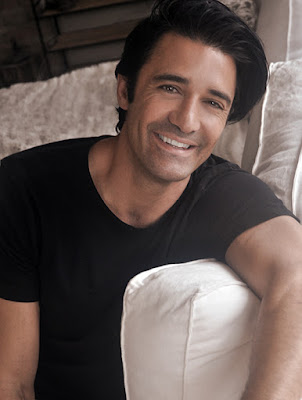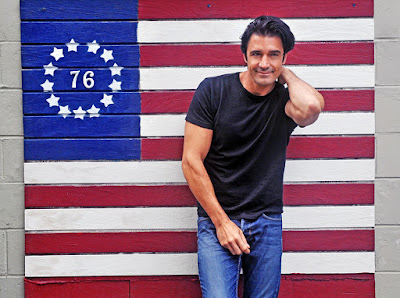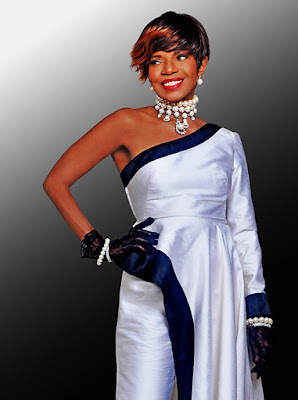All Photos: Alan Mercer Hat: Moonshine Nettie
To see these photos larger please click on them.
It is almost impossible to capture the remarkable life and career of Bebe Buell in a few paragraphs. Her lengthy and respected musical career has shown her to be an important artist with razor sharp musical instincts; a singer, songwriter and performer with a power and command rarely seen in entertainers. Bebe has the unequaled gift of being able to delve into a song and spark it to life with immediacy and poignant raw emotion; whether performing her own works or her always groundbreaking choices of songs by other writers.
Bebe's unique, multi-faceted talent manifested itself at an early age. At ten years old she began singing in the Villa Maria Academy choir sporting an "alto" a very unusual, deep vocal range for a young girl, that caught everyone's ear.
Upon graduating from high school she was discovered by super- agent Eileen Ford of Ford Models. She was whisked away from Virginia Beach to New York City and hit the Manhattan music scene as soon as she arrived. She soon became involved with legendary rock musician Todd Rundgren. At the time, she was living in a woman’s residence run by nuns.
Affectionately called "Friend To The Stars", Bebe earned that title because of her closeness to everyone from Jack Nicholson to Patti Smith, and her carte blanche access to rock's elite royalty. She was frequently dubbed a "legendary beauty" by photographers and peers alike. Mick Jagger was once quoted as saying that he could bring Bebe "when I dine with royalty."
Bebe's musical career jumpstarted with her first release, ‘Covers Girl’ in 1981 produced by Ric Ocasek and Rick Derringer. It was a four song EP of obscure cover songs featuring legendary group The Cars backing her on two of the tracks, which was also, coincidentally, Rhino Records first release. Bebe's pure love of music and natural sense of cool come through on these recordings.
When Bebe's daughter Liv found out her father was really Steven Tyler, not Todd Rundgren, 1991 became a year of big changes. Well documented in the media, Bebe has said in interviews that she didn't want to tell Liv who her real father was because of Steven's heavy drug addiction at the time. Todd had known that he was not the biological father of Liv but had kept the secret in order to give both Bebe and Liv some semblance of a stable home. Steven got sober and the news of Liv's parentage was no longer a secret.
In 2000, the Oscar winning film "Almost Famous” was released. Writer/director Cameron Crowe based the film on elements of Bebe's life. Some of the film's dialogue is directly taken from quotes of Bebe's that Crowe had remembered from their friendship which began decades earlier in 1973 on the road with Todd Rundgren.
Bebe completed her autobiography, "Rebel Heart; An American Rock And Roll Journey" (St, Martin's Press) in 2001. It quickly became a New York Times best seller. The following year she married Jimmy Walls of Das Damen and Vacationland fame. In 2008 they bought a house in the New York City area and began the concept for Bebe's next musical chapter. The result was two critically acclaimed albums "Sugar" and "Hard Love" and performing for capacity audiences in New York City and the Northeast United States.
The singer/songwriter and pop culture icon now calls Music City home. Bebe, dubbed the “Mother Of Rock & Roll” came to Nashville in 2012 to sing on an Eddy Arnold tribute album for local label Plowboy Records. Being a Southern girl at heart (she was born and spent her childhood in Virginia) Bebe immediately fell in love with the city.
In her short time in Music City, Bebe has graced several local stages including three sold out shows at the iconic Bluebird Café and recorded at famed studios, RCA Studio B and Sound Emporium. She has also been songwriting prolifically, including a duet with Crystal Gayle (who joins her onstage regularly).
This year is shaping up to be one of Bebe Buell's most exciting yet. In addition to her new music, band and stage show, expect projects in film and a return to the literary world. Bebe has never allowed herself to be stereotyped or pigeonholed. A musician, mother, muse, model, celebrated lover, manager, best-selling author, and pop culture icon, music has always held her deepest passion.
Scarf designed by Manuel Hat designed by Ivy Silverstein
AM: Bebe, wasn’t it two years ago on Mother’s Day that you did your first sold-out Bluebird show?
BB: Yes, Mother’s Day 2014 was my LIVE debut in Nashville. So Mother’s Day holds a very special place in my heart, not only because I’m a mother and I have a third grandchild coming in July, but because I had an epiphany with my first live show at the Bluebird Café. And I got my first break here at The Bluebird thanks to Erika who gave me a shot. I’m very connected to the spirit of Mother’s Day.
AM: I’d say so.
BB: Another thing I like about Mother’s Day is it's an empowering celebration of women- the Mother. A tip of the hat to childbirth. Not everyone can grow a human being in their body! And then give birth to a new life.
AM: What is your message to your audience?
BB: My message to people is you can do anything for as long as you want, as long as you do it well, as long as you have something to say. Some examples of people I can think of now are Patti Smith, Debbie Harry, Jane Goodall and your friend Mamie Van Doren. There’s a wealth of knowledge that comes from a woman who’s lived a full life. You don’t have to ever be jaded. I still feel like a child when I see things for the first time. I continue every day to see things through fresh eyes. People say to me, “Oh you’ve seen it all. This isn’t your first time at the rodeo!”
Well, I’ve never been to a rodeo. Each thing that happens to me is a new experience. Even if there are similarities to something else, it’s still something enlightening and new. My message is the empowering of the human spirit to keep going even in the eyes of adversity.
AM: That’s a great message.
BB: Sometimes that attitude makes people jealous but I’m trying to stop that. I don’t want people to be envious. I want them to be empowered. I’ve also been called the Mother of Rock & Roll for years and years.
AM: Who was the first to call you that?
BB: Maybe it was Jack Nicholson, I’m not sure. Joey Ramone came up with "The Girl With Windex Colored Eyes" way back in the late 80's. And I've always been a "Rebel Heart".
AM: That is a great moniker. Why do you think people think of you as the Mother of Rock & Roll?
BB: I think I got it from being so motherly to all my friends. I love taking care of people, cooking for them, inspiring people and helping them come up with ideas. That will always be part of who I am even though my own art is very important to me. Then I can go up onstage and my Bebe Bad Ass comes out... my healing continues with my music and message. My strength continues in my persona which embodies my inner courage. I find so much happiness from performing. Entertaining people is in my DNA for sure!
Scarf designed by Manuel
AM: I know you released a single called ‘Secret Sister’ and ‘Hello Music City.’ Of course I own and love them both! Do you plan anymore recordings in the near future?
BB: I wrote those songs when I first came to Nashville in the summer of 2013 with my husband Jim and Jon & Sally Tiven. Jon was really helpful in getting me started on a fresh path and I'm eternally grateful. I'm writing constantly but what I'm working on right now is a big passion for me. My One Woman show I'll be calling "Rebel Soul". Yes, it's a continuation to my New York Times best selling bio "Rebel Heart", which came out in 2001.
AM: Are you going to be on stage by yourself?
BB: Even though it’s called a one woman show I’m going to have a couple people up there with me. It’s a stripped down show with only a drummer and a guitar. I’ll be telling stories about my life and singing songs.
AM: I am excited about your one woman show!
BB: I’m traveling light with a drummer and a guitar player. My drummer will also sing so there will be harmonies. Of course my husband Jim will be the guitar player. He’ll be able to handle that very well all by himself. I love two piece bands anyway, and as much as I love bass guitar, you'd be surprised at the things my husband can do on a guitar. He's got game and then some!
AM: Who is your drummer?
BB: I haven’t decided on the drummer yet although I have a couple of candidates. I’m hoping it can be a woman actually. I would love that. Jim and I are forging ahead and getting all the material together so whoever we bring on board will feel comfortable and be ready to jump right in. I love the drummer I've played with for almost three years, Shannon Pollard, but he's got an empire he's running and won't be able to tour so we've got to find someone who wants to hit the road.
AM: What made you decide to do this show?
BB: The reason I’m doing it is because I’ve been in loud Rock & Roll bands my whole life and a lot of people tell me it’s the story telling and the healing aspect of what I do that they get so much benefit out of. So it dawned on me that I need to go back into the Bluebird in a stripped down format. You can lay your soul bare in that magical room. The Bluebird is very intimate.
AM: Are you ready to debut the show yet?
BB: I’m going to be working on this presentation for at least another month or two. It’s a big deal. There’s a lot of dialogue. People may not realize that when you put on this kind of show there is a formality you have to follow. And when I take it to bigger stages there will be a little movie and slide show that runs along with it.
AM: Is it like writing a script?
BB: Sort of. When you write it yourself it’s so submitted to memory you don’t have to learn it like a script that somebody else wrote. It does have to have an order and a structure however. I'm sure each delivery will have wonderful spontaneous moments, too. That will be part of the fun.
AM: Will you still play with a full band occasionally?
BB: I played my last full band live show this past February 18th at Third & Lindsley. I won’t be doing a full band show again for a while.
AM: Oh bummer.
BB: I'm not stopping- I'm just trying new things. I’ll still get up on stage and sing as a guest when I’m invited. My favorite Nashville band right now, along with The Blackfoot Gypsies, is Thee Rock N' Roll Residency. They play every Tuesday night at the Harp & Fiddle. They’ve created this incredible scene over there along with Brandy Goldsboro. The place is packed to the gills every Tuesday. They play all covers but they put their own spin on everything making it sound fresh. They always have guest signers like Robin Zander from Cheap Trick, Alice Cooper, Lzzy Hale, Hannah Firelight, to name a few, and I recently got up there and sang with them. I'm smitten and hooked so I will continue to do that when I can. I want to stay relevant in my musical community. I like the little pockets of scenes they have here in Nashville. I will always like singing with my friends, The Long Players, the brainchild of the brilliant Bill Lloyd. They take an album and recreate it with guest singers for the various tracks. The last show I did with them was The Rolling Stones ‘Some Girls.’ I sang ‘Beast of Burden’ and then I came back and did a favorite that isn’t on the album, ‘Paint It Black.’ We ripped through "Satisfaction", too! One of my highlights with The Long Players was The Bowie tribute at The Frist Museum. Singing "Moonage Daydream" and "Rebel Rebel" under a full moon is a memory I'll treasure forever. This was before Bowie's passing so the emotional connection is profound for me.
AM: Any other projects you can talk about?
BB: I just shot a sizzle reel for a show called ‘Routes of Rock’ here in Nashville. The format would take me all around the world to locations where all the great music was created and inspired. The show's creators want me going everywhere from Kashmir to Loch Ness.
AM: Wow Bebe!
BB: I’ll be the female Anthony Bourdain without the food. Ha! Each episode will feature a different artist or band. We’ll go to various locations where they would hang out- their haunts or childhood home, and I’ll talk to the people behind the scenes. It’s being submitted to networks as we speak. I also wrote a movie eight years ago that I never thought I could get made because when I wrote it I lived in NYC and it's set in the South. But now that I’m in Nashville, I can shoot it right here. Isn't fate interesting?
This movie is my baby. I can hardly wait to release the details, the cast and everything about it. It's going to have an epic soundtrack to boot. I'll keep you posted on both projects as we move forward. I have to say, this is the most exciting time of my artistic and spiritual life and growth!
AM: You really are doing a lot!
BB: I’m expanding my brand. I’m going beyond music and incorporating film, television, storytelling and healing into my message. I want to travel and do as much good work as I can until I go to wherever Prince, Bowie and Oscar Wilde are hanging out. I definitely want to go there.
To learn more about Bebe Buell visit her web site http://www.bebebuell.org/
Follow Bebe Buell on Twitter https://twitter.com/BebeBuellBand



















































































































